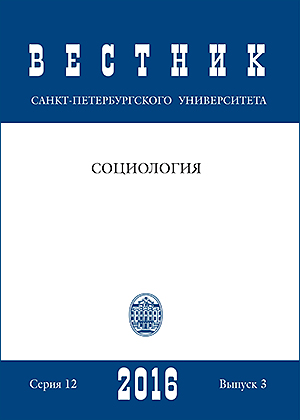Hand-made as the autonomizing field of symbolic production
DOI:
https://doi.org/10.21638/11701/spbu12.2016.305Abstract
The article analytically regards the sociological phenomenon of the ‘handmade’. The author investigates its historic origins, relations to global and local cultures, and the process of the manual labour valuation in the virtualizationing society. There are investigated handmade contemporary development probable factors, such as the feministic ideology, the global economic crisis and the handiwork tradition of lower and higher (idle) classes. Handmade is claimed to be connected with the “Arts & Crafts” movement and with the encounter of local cultural traditions in the global space created by the new media. Aesthetical, social and psychological contents of handmade activities are analyzed. We regard to both the subjective motivation of participation in handmade activities and the change in the way products are used, deriving from the growth of artisans’ skills (the opportunities for use, presentation or sale). Practices of the experience of exchange between handmade artisans and critical absence are also put under bourdieusian consideration as a means to create the mutual recognition necessary for the distribution of the nomination authority in the emerging field. Handmade products are considered as reified social actions and relations, delegates in latourian sense. It is demonstrated, that handmade approves the unconditional value of the manual labour, aiming to occupy the position of the fine arts with its unable-to-negate symbolic value of artistic production. Therefore, contemporary handmade is explored as successfully making bids for creating its autonomous field between that of fine arts and design Refs 18.
Keywords:
handmade, manual labour, artwork, field of symbolic production
Downloads
References
References
Downloads
Published
How to Cite
Issue
Section
License
Articles of "Vestnik of Saint Petersburg University. Sociology" are open access distributed under the terms of the License Agreement with Saint Petersburg State University, which permits to the authors unrestricted distribution and self-archiving free of charge.




